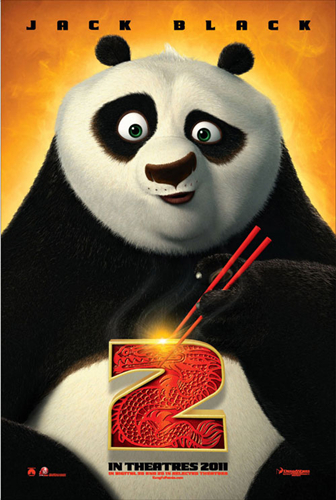Boycotting 'Kung Fu Panda' is narrow-minded
- By Qin Huaichuan
 0 Comment(s)
0 Comment(s) Print
Print E-mail
China.org.cn, June 9, 2011
E-mail
China.org.cn, June 9, 2011
|
|
|
Poster of Kung Fu Panda 2 [Photo: m1905.com] |
At midnight on May 28, the world's most famous panda "Po" returned to theaters. Tickets for the first screening of "Kung Fu Panda 2" sold out in minutes.
But some voices such as Zhao Bandi, a Chinese performance artist, have called for a boycott of the film. Zhao argues the film is part of American's cultural invasion of China.
Kong Qingdong, a professor from Peking University, agrees.
Are they overreacting? Hollywood has indeed made enormous profits from the film, and it does borrow Chinese symbols. But is that enough to make a movie part of a "cultural invasion?" Are Hollywood directors really plotting to brainwash and control our minds? These claims are dubious.
If Hollywood really captured our minds, what's worth discussing most is why our brains are so easily controlled. There are many domestic films produced each year. Why can't they capture our hearts just as "Kung Fu Panda 2" has?
Many Chinese film fans try to bring credit to domestic film industry. They hope more Chinese movies will be shown abroad and welcomed by overseas audiences. But it is narrow-minded to blame foreign films when they don't without reflecting on the Chinese industry's shortcomings.
The reason why the "Kung Fu Panda" series is so popular among Chinese is not just because it features a panda. The deep meaning and simple values that underlie the series, the inspirational and optimistic spirits it carries, and the technical prowess with which it was produced all contributed to its great success. These elements are also needed in China's domestic films.
Hollywood's appeal to Chinese filmgoers begs the question: Can Chinese artists produce similar films? Currently, we should learn from the Western countries' experience in making movies. It's not wise to boycott the film.
Hollywood's launch of "Kung Fu Panda 2" presents us with a practical problem: how to improve China's soft power. China exports only a handful of films each year. As Zhao Qizheng, former chief of the State Council Information Office, put it, if China only exports TV sets and not TV programs, its 5000 years of history and culture will be reduced to a hardware factory. The words hit the nail on the head.
In order to enhance its soft power, China should be confident and learn from other countries. With enduring effort nurtured by the lessons drawn from other countries, the overall quality of China and its people will be improved. We should concentrate on self-improvement and not be swift to boycott others.
The author is a journalist from the southeastern China's Nanjing City.
(This article was first written in Chinese and translated by Li Huiru.)
Opinion articles reflect the views of their authors, not necessarily those of China.org.cn.







Go to Forum >>0 Comment(s)